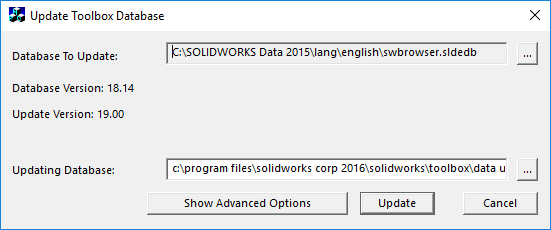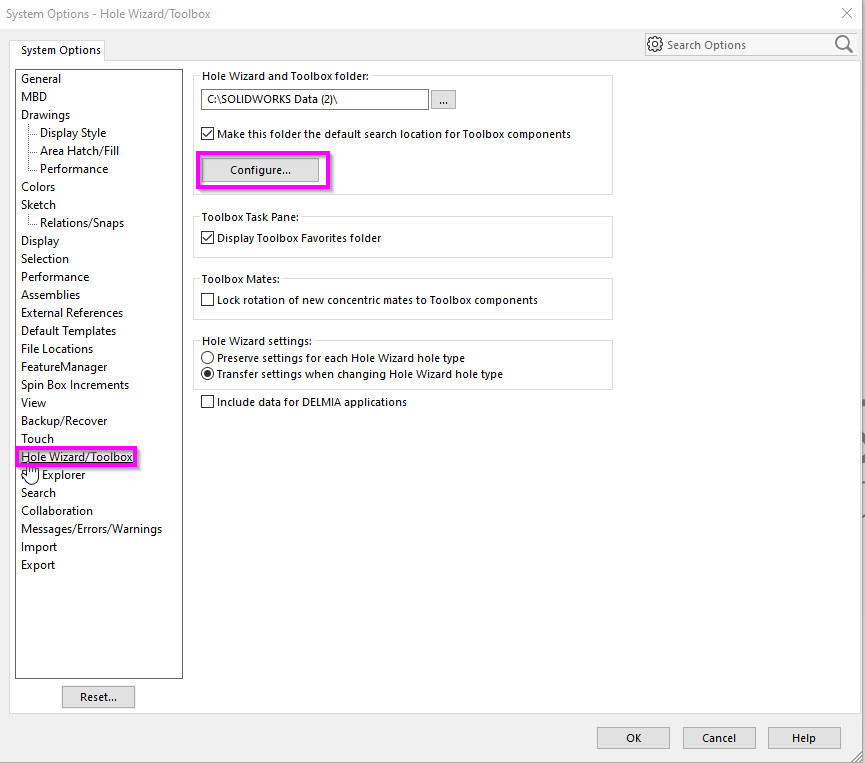
- #Create backup of solidworks toolbox how to#
- #Create backup of solidworks toolbox install#
- #Create backup of solidworks toolbox archive#
- #Create backup of solidworks toolbox upgrade#
- #Create backup of solidworks toolbox professional#
The default location is C:\ProgramData\SOLIDWORKS\SOLIDWORKS 2020\design library\routing\ The Routing Libary is a fancy name for the folder with all your routing models. More terminology is explained in the official Glossary. They can be used to create drawings and BOMs. You can define multiple spools in one route assembly. Very important.įor other components, this is a setting for each Connection Point / CPoint.Īn assembly that can be manufactured as one item. The property SOLIDWORKS uses to match a pipe to a flange or fitting. Non-dimensional number for the wall thickness of a pipe. The folder that contains all routing part files.Ī long list of all configurations that are found in all routing parts. Has similar use as the Schedule for the North American standard. Rigid standard tubing from steel or plastic. North American set of standard pipe sizes.Ĭombined with a Schedule for pressure rating/wall thickness.Ģ-inch pipe always has 60.3mm outer diameter.Įurope uses DN number, where 2 inch = DN 50.

Has similar use as the NPS for the North American standard. I had trouble understanding the jargon when working with Routing, so I thought I’d explain a few terms first. Now you only need to turn on the Routing add-in:
#Create backup of solidworks toolbox install#
You also need to select Routing when you install SOLIDWORKS, although it is enabled by default.
#Create backup of solidworks toolbox professional#
Source: the official feature comparison for SOLIDWORKS Standard, Professional en Premium. The only way to get the routing add-in is to get a SOLIDWORKS Premium license. That section got so large that we decided to give it its own post.
#Create backup of solidworks toolbox how to#
To learn how to create parts and assemblies that are compatible with routing, check out How to create Routing components. Routing heavily relies on 3D sketches and virtual components. You use library parts to create routing assemblies, which are often stored as virtual assemblies within your main assembly. Routing is a SOLIDWORKS add-in that lets you create piping, flexible tubing, cabling and wire harnesses. This post will be a constant work-in-progress, so please let us know if you have something to add, if it lacks crucial info or if it contains a mistake. So we decided to collect all the useful information here. Please wait a few minutes and refresh this page.It is hard to find any good information on setting up a Routing library on the web.īest practices are practically non-existent.
#Create backup of solidworks toolbox upgrade#

– From SOLIDWORKS 2014 or earlier: vault_name\ Toolbox_folder_name\lang\ your_langauge\ SWBrowser.mdb

#Create backup of solidworks toolbox archive#
Ensure that there is a full backup of the vault database and archive and make sure that the entire Toolbox folder is not checked out or in use by any current checked out assemblies. Because Toolbox is managed in a multiuser environment, only one user is required to upgrade the Toolbox in SOLIDWORKS PDM globally for all users.īefore you start the upgrade, you must prepare the Toolbox folder. Upgrading the Toolbox is performed as a part of a SOLIDWORKS upgrade, using the SOLIDWORKS Installation Manager.

This post will describe the process of upgrading your Toolbox in SOLIDWORKS PDM. In the excitement of getting the latest edition, many forget to upgrade their Toolbox as well. This is an issue we regularly receive when a new SOLIDWORKS version is released and you have upgraded SOLIDWORKS and PDM. Did you recently upgrade SOLIDWORKS and PDM, and are seeing this error message? Then you have most likely not upgraded your Toolbox in PDM.


 0 kommentar(er)
0 kommentar(er)
